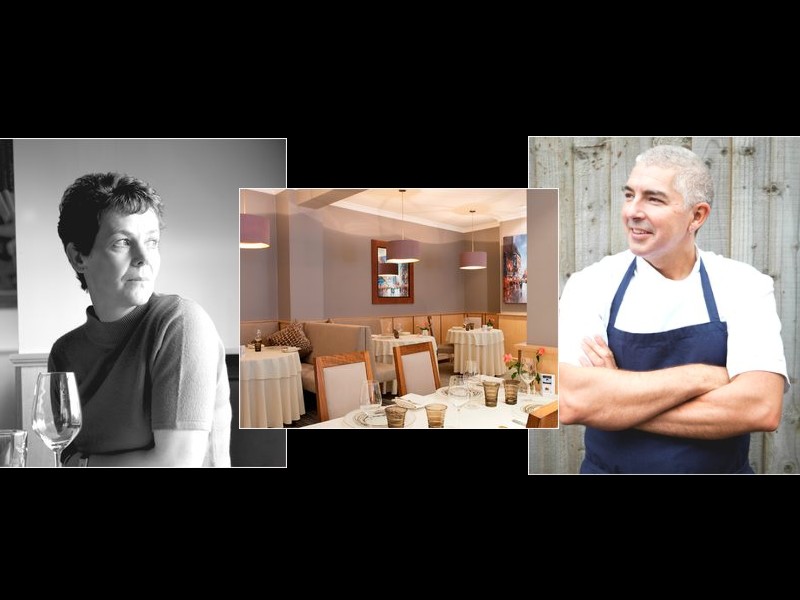Many would argue that keeping a small quality restaurant in business for more than a quarter of a century is, in itself, an achievement worthy of the word “outstanding”. What chef David Everitt-Matthias and his wife Helen have done at the two Michelin-star Champignon Sauvage in Cheltenham goes far beyond that. They have created a restaurant of extraordinary consistency and ambition which has quietly been at the forefront of British gastronomy, without ever courting the limelight.
“David is just true to what he believes,” says Tom Kerridge, chef of the Hand & Flowers, who nominated Le Champignon Sauvage for this year’s Outstanding Contribution award. “He’s never swayed by fashion, and he’s always updating what he does. It is one of the most phenomenal restaurants this country has, yet one of the least known.”
Le Champignon Sauvage was one of the first restaurants at its level to turn away from luxury ingredients in favour of the humble; years before Noma in Copenhagen made foraging the foodie buzzword of the century, they began experimenting with what could be found in the hedgerows around them in the Cotswolds. The result is an earthy and intense style of cooking, where duck hearts turn up with fish and acorns in panna cottas; where menus are spotted with references to braised cockscomb, dandelion root or parsley root purees.
Despite the tiny brigade – it used to be just two of them; now there are four – the kitchens here have been a starting ground for some of Britain’s greatest young talents, including Lisa Allen of Northcote Manor, Marcus McGuinness, now head chef at Claude Bosi’s Hibiscus and Sam Miller who, until recently, was number two at Noma. Their work has brought them two Michelin stars, but more than that, the love of their peers. “Last year, when they celebrated their 25th anniversary, loads of chefs made the journey from London,” says Kerridge. “Pierre Koffmann was there, Phil Howard of the Square, Brett Graham of the Ledbury. We’re just fans.”
“I’m still here at 8am every morning,” Everitt-Matthias says. And if he’s not there, they close. “It’s an item of faith. I believe, perhaps archaically, that a chef belongs in his kitchen.” He recently appeared on Saturday Kitchen, his first piece of major television, an experience he says he enjoyed but for which, again, he closed the restaurant. ‘For two weeks before I did that I was bricking it.’ It’s clear where his comfort zone is: in the kitchen, and the same one at that.
Not that it was meant to be this way. David and Helen met at the Four Seasons Hotel in London. When they arrived here in 1987 it was planned as a three-year project. “Then the recession hit, interest rates were at 15% and we couldn’t get out.” These were the tough times, but Everitt-Matthias admits it had an interesting effect on his cooking. His training had been very much classical French; as he puts it “a lot of things were stuffed with mousse”. With customers scarce things had to change. “That meant using the offal and cheaper cuts. It gave me a style.” He became intrigued by humbler ingredients: mackerel instead of sea bass, wood pigeon instead of the grand pigeon de bresse. That, along with his interest in foraging, defines his food.
Much has changed about the restaurant over the years. It has expanded from just 28 seats to 40; there’s now a wood-panelled elegance to the dining room. But it’s all defined by the food and the relationship between David and Helen. “The dining room is my domain and he doesn’t interfere,” Helen says. And then, unselfconsciously to David, “You’re quite unique. You just do what you do.”
Clearly she’s biased, but she’s right. What of the future? “I just want people to know we’re here and still relevant,” Everitt-Matthias says. And is there no hunger for the limelight? He laughs. “We don’t need to get rich. If I’d wanted that we could have moved to London. I’ve got a wonderful pantry in the Cotswolds and a great quality of life.”
One of Britain’s greatest chefs, in charge of one of Britain’s greatest restaurants, just wants to be in the kitchen. How refreshing.
Le Champignon Sauvage, Suffolk Road, Cheltenham; 01242 573 449; lechampignonsauvage.co.uk
guardian.co.uk © Guardian News & Media Limited 2010
Published via the Guardian News Feed plugin for WordPress.


